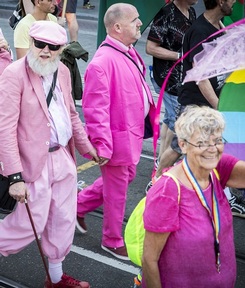LGBT+ community 'let down' by care workers say MPs
The majority of care professionals (72 per cent) do not consider sexual orientation and gender identity to be relevant to one’s health needs, according to MPs who have published a House of Commons report on LGBT+ care.

A cross-party group of MPs sitting on the House of Commons Women and Equalities Committee published a report revealing staff training varies hugely and raised concern that ‘staff may not receive any training on LGBT+ issues.
They also feel people are being let down in health and social care’ by structures and services that are not inclusive or designed with them in mind.
In July 2017, the government launched a nationwide LGBT+ survey. The survey asked LGBT+ for views on public services and about living as an LGBT+ person in the UK. The survey received over 100,000 valid responses, making it the largest national survey to date of LGBT+ people anywhere in the world.
’There should be LGBT+ specific care homes as ‘need and demand is high’
Maria Miller MP, Chair of the Committee, said: “We found a lot of good will in health and social care services to make them LGBT+ inclusive, and examples of good practice” that must be shared but she also warned “the best will in the world won’t change the systemic failings.“
Failures in data-collection and training she said led to “poorer experience” and “poorer health outcomes” for LGBT+ people.
“This can never be acceptable. Mainstream services must move now to ensure that they are inclusive and are effectively identifying and taking into account the needs of the LGBT+ communities. We must eliminate the unacceptable inequalities in health outcomes that glare out wherever you look.”
The inquiry heard evidence to suggest most care professionals feel under-equipped to deal with LGBT+ people’s needs rather than intentionally discriminating.
The committee reported that staff are struggling to communicate effectively with LGBT+ people or to understand how sexual orientation and gender identity are important to person-centred care or do not understand the best approach to take when it comes gender identity.
One trans gay man responding to the survey said he feared going into a care home, admitting he would prefer death over going into care. He said: “My biggest champion is my husband and there’s a history of early onset dementia in my family. All my family are back in US. If my husband goes first, and the choice is a care home here or returning to US, I’m not sure I want to be around.”
Another poll respondent felt that there should be LGBT+ specific care homes and said: “Need and demand is high.”
On a positive note, another poll participant spoke of a local care home that was very explicit in its inclusion of LGBT+ people, using rainbow symbols and t-shirts with slogans that make it clear that LGBT+ people are welcomed and respected. In evidence given to the enquiry, the Care Quality Commission (CQC) said they recognised these problems and will continue to improve how it inspects the experiences of LGBT+ people in adult social care. The CQC has said it will begin to inspect all gender identity clinics.
'There is work still to be done with health and social care providers'
The CQC has told MPs it will develop guidance for its inspectors about people who are transitioning their gender and will look to embed LGBT+ equality issues in the guidance.
In the report, Debbie Ivanova of CQC said: “We will make sure that people are not discriminated against. If people felt they were discriminated against because of their faith, religion or sexual orientation, we would follow that through and make sure they had access to complaints and were able to do that.”
“There is work still to be done with health and social care providers to move them away from a view that “person-centred” means that everyone is treated the same and to a better understanding of the individual needs of LGBT+ people.”
The enquiry recommends sexual orientation monitoring should be made mandatory across all NHS and social care providers within the next 12 months. Any service provider who does not should face a fine.
All commissioning outcome frameworks should include an explicit requirement to demonstrate how a service provider will meet equalities obligations and best practice and show that it has consulted on and considered the needs of LGBT+ service-users.
To read the report click here
Latest News
 29-Jul-24
Dementia Bus gives carehome.co.uk staff insight into life with dementia
29-Jul-24
Dementia Bus gives carehome.co.uk staff insight into life with dementia
 01-Mar-24
Find out the top care homes in 2024
01-Mar-24
Find out the top care homes in 2024
 21-Mar-23
UK's top care homes in 2023 revealed
21-Mar-23
UK's top care homes in 2023 revealed
 03-Jan-23
carehome.co.uk launches free care helpline
03-Jan-23
carehome.co.uk launches free care helpline
 13-Dec-22
5 mins with Emily Whitehurst, chief operating officer for Constantia Healthcare
13-Dec-22
5 mins with Emily Whitehurst, chief operating officer for Constantia Healthcare